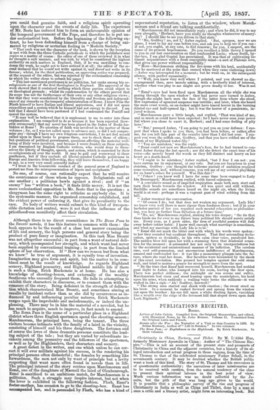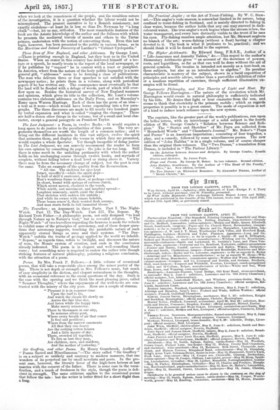PUBLICATIONS RECEIVED.
BOOKS.
Letters of John Calvin. Compiled from the Original Manuscripts, and edited, with Historical Notes. by Dr. Jules Bonnet. Volume II. Tianslated from the Original Latin and French.
Russia after the War : the Narrative of a Visit to that Country in 1855. By Selina Bunbury, Author of Life in Sweden." In two volumes.
The Rona Pass; or Englishmen in the Highlands. By Erick Mackenzie. In three volumes.
Christianity in China, Tartary, and Thibet. By M. L'Abbe Hue, formerly Missionary Apostolic in China ; Author of "The Chinese Empire."—This is not an account of the present state and prospects of Christianity in China and the adjacent countries, but a history of its alleged introduction and actual progress in those regions, from the time of St. Thomas to that of the celebrated missionary Father Schall, in the seventeenth century. It may be doubted whether the British public want a book of this kind. The story of St. Thomas and his successors is of questionable authenticity; the narratives of later missionaries are to be received with caution, from the natural tendency of the class to present their spiritual labours in the beet point of view. Much curious information was no doubt collected by the Jesuits, but the pith of that was long ago given to the world. Itis possible that a philosophic survey of the rise and progress of Christianity in India as well as China and Thibet, done by a man at once a critic and a literary artist, might form an interesting book. But when we look at the reureteucss of the people, and the resultless nature of the investigation, it is a question whether the labour would not be misemployed. The present narrative is by a Romish missionary, not exactly credulous-at least he is less so than Dr. Newman by a long chalk"-but, let us say, orthodox. The most remarkable features of the book are the Asiatic knowledge of the author and the fullness with which he presents the mediteval travels of monks and others to the Tartar princes, undertaken with the notion of converting them. Even this last topic however, has been presented to die public in various forms, as in the topic, and Inland Discovery of Lardner's "Cabinet Cycloperdia."
Three Eras of New .England, and other Addresses. By George Lunt. -There is printing enough in England, but they beat us in the United States. When an orator in this country has delivered himself of a lecture or a speech, he mostly trusts to the report of the local newspaper, or if he publishes by "request" he is content with a tract or pamphlet. In America, where from the nature of the body politic loquacity is a more pneral gift, "addresses" seem to be forming a class of publications. The man who delivers three or four speeches is not satisfied with the newspaper notice ; he prints them in a volume, along with periodical papers if he has written any. The consequence must eventually be that the land will be flooded with a deluge of words, part of which will overflow upon us. Besides the historical survey of New England manners and opinions, which gives its title to the collection, Mr. Lunt's volume contains two elaborate addresses on the Daily Press, and on Macaulay's Essay upon Warren Hastings. Each of these has the germ of an ideaa text as it were-which would have borne expanding into a few paragraphs. The three discourses are made to fill nearly two hundred pages by verbal expansion and what is called "ringing the changes." There are half-a-dozen other things in the volume, but of a small and local character, except a general panegyric on President Taylor.
The Last Judgment : a Poem, in twelve Books.-It would require a long space to do justice to the peculiarities of this poem. The very arguments themselves are worth the length of a common notice ; and to bring out the different incidents in this vast subject, evolve the spirit that animates them, and display the verses in which they are presented, would require a whole Spectator. Yet though incapable of doing justice to The Last Judgment, we can scarcely recommend the reader to form Ins own opinion by consulting its pages : the joke is far too long. Still there is some merit in the nfailing pertinacity with which the author holds on his unchanging course through twelve books, and myriads of couplets, without falling below a dead level or risinr.' above it. Variety there may be from the necessary change of subject, but the poet is ever the same. Take an example of the quality from the Resurrection. "All rise. The skeleton for ages kept
Intact, uneoffin'd-while the spirit slept In hall of skill'd anatomist, design'd Man's wondrous frame to show, or perhaps confined In closet, bound with springs of curious clutch,
Which secret moved, obedient to the touch,
While mirth, and merriment, and laughter spread Laughter unseemly, mirth amid the dead ! That skeleton with sudden life unfolds ; And while its owner with amaze beholds, Those bones renew'd, their wonted flesh assume, And man starts forth in full immortal bloom."
The Travellers : an Argument in three Parts. Part I. The NightWatch. Part II. The Day-Watch. Part III. The Repose. By Richard Trott Fisher.-A philosophic poem, not only designed "to lead through Nature up to Nature's God," but to revealed religion. "The Night-Watch" of two travellers regarding the heavens is made the vehicle to exhibit some of the principles of astronomy, and of those deeper questions that astronomy suggests, touching the perishable nature of such apparently eternal things as suns and their systems. "The DayWatch" unfolds the truths of geology applied to the world we inhabit. "Repose," as regards time, refers to twilight, and discusses the nature of man, the Mosaic system of creation, and ends in the conclusion already indicated. The poem is in elegant and well-sounding blank verse ; but something more is required to endow the rather trite though striking features of natural philosophy, pointing a religious conclusion, with the attraction of a poem.
Poems. By Mrs. Frank P. Fellows.-A little volume of occasional poems, that will take a respectable place among the minor poetry of the day. There is not depth or strength in Mrs. I ellows's muse, but much of easy simplicity in the diction, and elegant naturalness in the thoughts, with an occasional reference to the social questions of the day. Such is the case with the opening and we think the most pleasing piece, called "Summer Thoughts," where the enjoyments of the well-to-do are contrasted with the misery of the city poor. Here are a couple of stanzas.
"Pleasant it is in summer-time
Upon the turf to lie'
And watch the clouds flit slowly on Acrow the fair blue sky, And listen while the happy birds
Make merry minstrelsy.
There be thousands in our city, In noisome alleys pent, Where every breath of air that comes Is foul and pestilent ; Where from the narrow easements All that they can descry Are the reeking rotten houses And a little square of sky : There, crowded all together,
To live as best they may, Are children, men, and maidens,
And the mother of yesterday."
Sir Geoffrey, and other Poems. By Henry Grazebrook, Author of "Poems Sacred and Miscellaneous."-'rhe story called "Sir Geoffrey" is on a subject so unlikely and contrary to modern manners, that one wonders at its perpetual use by small novelists and poets. In the present case, however, the literary lover of the high-born heiress at last marries with the consent of the father. There is some ease in the versification, and a touch of freshness in the style though the poem is deficient in strength. The same criticism applie; to the occasional poems that follow the tale : but the writer is better fitted for a short flight than a long. The Practical Angler; or the Art of Trout-Fishing. By W. C. Stewart.-This angler's vade-mecum is somewhat limited in its nature, being confined to trout-fishing in Scotland, and is mainly directed to fishing in clear water, because the author holds that any one may succeed in darkcoloured water. The true angler's work begins when the stream is low, the water transparent, and every lure distinctly visible to the trout if he uses his eyes. Fly-fishing receives ample attention, but Mr. Stewart neglects no branch of the art; worm-fishing (without a float) having a chapter devoted to it. The book is what it professes to be, practical; and we should think it will be found useful to the aspirant.
The Higher Arithmetic. By Edward Sang, F.R.S.E., Author of a "Life-Assurance and Annuity 'rabies," &c.-This sequel to the author's. Elementary Arithmetic gives "an account of the doctrines of powers, roots, and logarithms, so far as that can well be done without the aid of general symbols. The treatise is intended not merely as a text-book on these subjects, but also as an introduction to algebra." Its peculiar characteristic is mastery of the subject, shown in a lucid exposition of principles and sensible advice, rather than a parrotlike exhibition of rules or a needless repetition of exercises, though sufficient illustrative examples will be found.
Systematic Philosophy, and New Theories of Light and Heat. By George Fellows Harrington.-The nature of the revolution which Mr. Ilarruigton would create in natural philosophy is sufficiently indicated by his title. He denies that light or heat emanates from the sun, and. seems to think that electricity is the primuin mobile ; which as regards properties it possibly is to a great extent. The mode of exposition is not of a kind to induce much reliance upon the new system.
The reprints, like the greater part of the week's publications, run upon the belles lettres, with an interchange of a solid subject in the fourth edition of Mr. George Combo's "Relation between Science and Religion." The "Stories and Sketches" of Mr. Payit are collected from "Household Words" and " Chambers's Journal." Mr. Boker's "Plays and Poems" is an American importation ; consisting of four tragedies, a play, and a comedy, followed by some miscellaneous poems. The new edition of "John Halifax" is in a single volume, and of course cheaper than the original three volumes. The "Two Dianna," a translation from. Dumas, is included in "The Parlour Library."
On the Relation between Science and Religion. By George Combc. Fourth edition, enlarged.
Stories and Sketches. By James Payn.
Plays and Poems. By George H. Baker. In two volumes. Second edition. John Halifax, Gentleman. By the Author of "The Head of the Family," " Olive," Re. New edition, revised.
The Two Diana*: an Historical Romance. By Alexander Dumas, Author of Monte Christo," Sm.

























 Previous page
Previous page